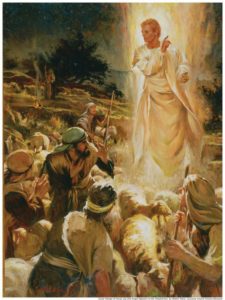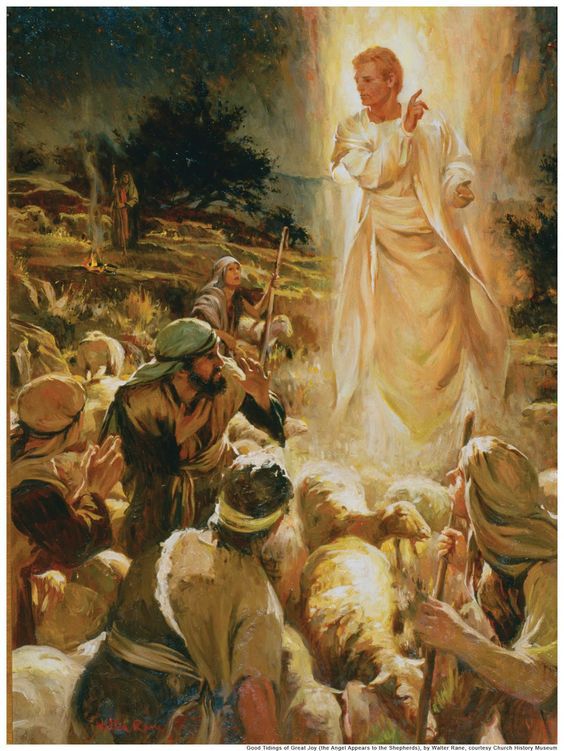
Central idea: Christ is born. Doctrine: The Christmas mystery. Practical application: Living the Christmas mystery.
This is an outline for the Mass at Dawn.
To view Lectionary 15 click here.
Central idea: Christ is born
Reading 1 Is 62:11-12
See, the LORD proclaims
to the ends of the earth:
say to daughter Zion,
your savior comes!
Here is his reward with him,
his recompense before him.
They shall be called the holy people,
the redeemed of the LORD,
and you shall be called “Frequented,”
a city that is not forsaken.
- Isaiah prophesizes that a savior will come to Israel. He has.
- He came with his reward for Israel. The recompense is his very person and his redemption, which makes the people who belong to him “holy.”
- This good news is not only to be proclaimed “to the ends of the earth.” It is meant to be embraced by people everywhere on earth.
Responsorial Psalm Ps 97:1, 6, 11-12
R. A light will shine on us this day: the Lord is born for us.
The LORD is king; let the earth rejoice;
let the many isles be glad.
The heavens proclaim his justice,
and all peoples see his glory.Light dawns for the just;
and gladness, for the upright of heart.
Be glad in the LORD, you just,
and give thanks to his holy name.
- The shepherds saw the glory of God on Christmas night.
- Christ’s justice and glory can be seen now by anyone who has the eyes of faith.
- Christians are now in the era of history in which we glorify God by working to establish justice on the earth. This justice is that everyone and everything be treated the way they ought.
- His justice over everyone and everything will be definitively established at his second coming in glory.
Reading 2 Ti 3:4-7
Beloved:
When the kindness and generous love
of God our savior appeared,
not because of any righteous deeds we had done
but because of his mercy,
He saved us through the bath of rebirth
and renewal by the Holy Spirit,
whom he richly poured out on us
through Jesus Christ our savior,
so that we might be justified by his grace
and become heirs in hope of eternal life.
- Christ not only saves us from sin and death. He also gives us the gift of the Holy Spirit so that we share in the very life of God.
- He does this out of mercy for us. It is his great gift.
Alleluia Lk 2:14
Glory to God in the highest,
and on earth peace to those
on whom his favor rests.
- This is the acclamation of the “multitude of the heavenly host” to the lowly shepherds (Lk 2:13).
- They glorify God for taking on a human nature.
- They declare that human beings can now have interior peace. That is, they can be reconciled with and be established in a state of friendship with God with and all creation, including their own selves.
Gospel Lk 2:15-20
When the angels went away from them to heaven,
the shepherds said to one another,
“Let us go, then, to Bethlehem
to see this thing that has taken place,
which the Lord has made known to us.”
So they went in haste and found Mary and Joseph,
and the infant lying in the manger.
When they saw this,
they made known the message
that had been told them about this child.
All who heard it were amazed
by what had been told them by the shepherds.
And Mary kept all these things,
reflecting on them in her heart.
Then the shepherds returned,
glorifying and praising God
for all they had heard and seen,
just as it had been told to them.
- The shepherds hurried to see Jesus, the promised Messiah.
- They repeated what the angel had made known. “To the shepherds, the angel announced the birth of Jesus as the Messiah promised to Israel: ‘To you is born this day in the city of David a Savior, who is Christ the Lord’” (CCC 437). The angel told this to the shepherds. The shepherds then told Mary and Joseph and all the others they encountered.
- The bystanders were amazed by the announcement, although they had not seen the angels.
- Was Mary also amazed?
- I think we can say that Mary was amazed by her entire life up to that point because of her unique relationship with God.
- Then, she entered a nine-month period of amazement beginning with the angel Gabriel’s announcement and her fiat.
- Then she experienced the amazement that every woman feels when she sees the child of her womb.
- On top of that was the amazement of the shepherd’s reminder who her infant was and what he would do.
- But Mary’s amazement was quiet. She did not speak but “kept all these things, reflecting on them in her heart.”
- Then the shepherds left, returning to their fields, “glorifying and praising God.” Because what they saw in Bethlehem corresponded to what the angel had said to them, they also believed what they heard but could not yet see, that this infant was the Messiah.
Doctrine: The Christmas mystery
- The mystery of Christmas is that a “marvelous exchange” has occurred in reality.
- God has become a sharer in humanity so that man can become a sharer in divinity. As the Antiphon for Evening Prayer for January 1 puts it, “O marvelous exchange! Man’s Creator has become man, born of the Virgin. We have been made sharers in the divinity of Christ who humbled himself to share our humanity” (CCC 526).
- But this exchange takes place in a surprising way. For it to happen, Christ must be formed in us. This happens when we are “born from above” or “born of God” by Baptism and the Holy Spirit and when we “humble ourselves and become little” (CCC 526).
- Christ makes this as easy for us as he can by becoming as little as a human being can be. “Jesus was born in a humble stable, into a poor family” and “Simple shepherds were the first witnesses to this event. In this poverty heaven’s glory was made manifest.” (CCC 525)
Practical application: Living the Christmas mystery
- We want to share in the divinity of Christ. We have already been baptized, so the thing left to do is to “humble ourselves and become little” (CCC 526).
- To humble ourselves we have to be persons of prayer. Mary is our model. She “kept all these things, reflecting on them in her heart.”
- This is a call to us to have a regular conversation with God, reflecting on everything in our lives: what brings us joy, what makes us sad, the mistakes we make, what we do well, our regrets, what we hope for, the people in our lives, everything.
- This is also a call to ask God what he wants us to do now and then to try to do it. This is putting into effect the petition in the Lord’s Prayer “Thy will be done on earth,” that is, that part of earth that falls within one’s will.
- An essential aspect of God’s will is the moral law. “Thy will” to be done is in the Commandments fully articulated, for example, in the Catechism; as summarized in the Great Commandment to love God above all and neighbor as oneself; or in the single New Commandment to love other persons with a sacrificial love, as Christ has loved us.
- To contemplate the infant Christ, reflecting on him in one’s heart this Christmas Octave is a good way to begin humbling oneself and becoming little.
The Homiletic Directory recommends the following Catechism points and themes for the Solemnity of Christmas:
- CCC 456-460, 566: “Why did the Word become flesh?”
- CCC 461-463, 470-478: the Incarnation
- CCC 437, 525-526: the Christmas mystery
- CCC 439, 496, 559, 2616: Jesus is the Son of David
- CCC 65, 102: God has said everything in his Word
- CCC 333: the incarnate Christ worshipped by the angels
- CCC 1159-1162, 2131, 2502: the Incarnation and images of Christ

Leave a Reply